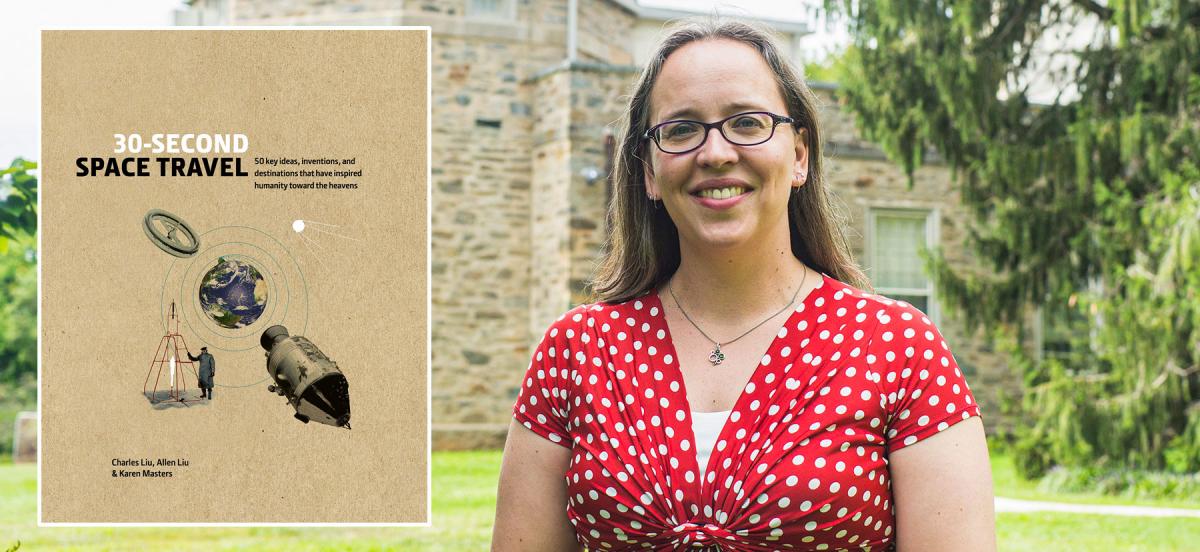Karen Masters on “30-Second Space Travel”

Associate Professor of Physics and Astronomy Karen Masters has co-written her second book in Quarto's 30-Second series, this one on space travel. Photo by Patrick Montero.
Details
The associate professor of physics and astronomy talks about her new book, which breaks down the 50 most significant topics and essential concepts in the field of space exploration for a general audience of readers.
In 2019 Associate Professor of Physics and Astronomy Karen Masters was part of a team who wrote a book that aimed to make the universe understandable to a wide variety of readers, regardless of specialized expertise. 30-Second Universe was part of a series by Quarto that presents big ideas, such as “money” and “feminism,” and technical fields, like engineering and biochemistry, in digestible, plainspoken prose for general audiences.
Masters has returned to the series, reteaming with her collaborator from the first book, Charles Liu—a professor of astrophysics at the City University of New York’s College of Staten Island, an associate with the Hayden Planetarium and of the department of astrophysics at the American Museum of Natural History—and his son, Allen Liu. Their new task? Explaining space travel and its essential concepts and important figures in bite-sized chapters that take only 30 seconds to read.
This latest book, 30-Second Space Travel, was released March 16 in the U.K. We spoke to Masters about her return to the series and why space travel is such a popular topic.
This is your second book in the series; how was the process of writing it different from 30-Second Universe?
Writing this book was pretty similar to the 30-Second Universe. My colleague Charles Liu had made a plan for the book, and we discussed article assignments between me, himself, and our co-author Allen Liu. The content differs by the focus on space travel. The focus here was on the human quest to explore the solar system and beyond, while "Universe" was more about the Universe itself—its past, current, and future. There is a little overlap where we described the possible destinations for space travel in our corner of the Universe (the solar system).
What made you want to return to the series? Would you want to write another 30-Second book?
I enjoy writing within the structure of the 30-Second series. It provides a nice challenge to write short, non-technical, but accurate explanations of specific topics with a word limit. This appeals to me. In terms of ideas for more books in this series: my research topic is galaxies in the Universe, and I am sure I could plan out a 30-Second Galaxies book, but there are no actual plans for that to happen. Another interesting one to me would be 30-Second Gravity—all about the theories of gravity we have and the impacts of gravity in the Universe.
Which chapters did you write?
We usually agree before we start writing how to divide up the chapters, and then work through them steadily over the period of a few months. I wrote chapters on some of the basic physics of space travel, some of the fun (and less fun) aspects of space travel, such as what it does to the human body, and how astronauts pass their leisure time. Towards the end of the process, I also did the glossary, which involved looking over terms from my and my co-authors’ chapters to define them in a short sentence.
Is any of what you’ve written about for this new book related to topics that you currently teach?
For the past couple of years I have been teaching a “Fundamental Physics” class (PHYS105) in the fall. This is typically the first college-level physics class many students take, which makes it really enjoyable for me to teach. In that class we do cover Newton's Laws, including projectile motion and some details of the rocket equations, as well as Newtonian gravity. All of these concepts are incredibly important for the mechanics of space travel, so they appear in this book, although in a more descriptive way that the mathematical way we cover them in PHYS105.
In 30-Second Universe, you wrote biographical chapters on women scientists; did you do that again for the book on space travel?
Actually, yes. This time I decided to write the biographies of Katherine Johnson, one of the women whose life it portrayed in the movie and book Hidden Figures, who was instrumental in the success of the Apollo program, and Sally Ride, the first American woman in space, who was actually also a physics professor. Both Charles and I believe it is important to make sure there is a diversity in the biographies included in these books, and Charles is very kind allowing me to pick the ones I want to write!
Why is it a good time for a book on space travel now?
I think it is an exciting time for space travel. The new Mars rover (and the helicopter!) are exciting, as are things like the first commercial human space travel (the SpaceX launch, which happened at the end of May 2020). There are also hints at the opening up of space, with tickets for trips on offer with Virgin Galactic. Space travel also seems to be on TV more recently, with shows like the Expanse, Away, and Space Force.



